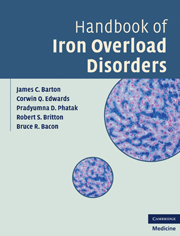Book contents
- Frontmatter
- Contents
- Foreword by Anthony S. Tavill
- Preface
- 1 History of iron overload disorders
- 2 Normal iron absorption and metabolism
- 3 Iron toxicity
- 4 Tests for hemochromatosis and iron overload
- 5 Complications of hemochromatosis and iron overload
- 6 Insulin resistance and iron overload
- 7 Infections and immunity
- 8 Classical and atypical HFE hemochromatosis
- 9 Heterozygosity for HFE C282Y
- 10 Porphyria cutanea tarda
- 11 Mitochondrial mutations as modifiers of hemochromatosis
- 12 Hemochromatosis associated with ferroportin gene (SLC40A1) mutations
- 13 Hemochromatosis associated with hemojuvelin gene (HJV) mutations
- 14 Hemochromatosis associated with hepcidin gene (HAMP) mutations
- 15 Hemochromatosis associated with transferrin receptor-2 gene (TFR2) mutations
- 16 Iron overload associated with IRE mutation of ferritin heavy-chain gene (FTH1)
- 17 Hereditary hyperferritinemia-cataract syndrome: IRE mutations of ferritin light-chain gene (FTL)
- 18 Iron overload in Native Africans and African-Americans
- 19 Hereditary atransferrinemia
- 20 Divalent metal transporter-1 (SLC11A2) iron overload
- 21 Iron overload associated with thalassemia syndromes
- 22 Iron overload associated with hemoglobinopathies
- 23 Iron overload associated with pyruvate kinase deficiency
- 24 Iron overload associated with congenital dyserythropoietic anemias
- 25 Hereditary sideroblastic anemias
- 26 Pearson marrow–pancreas syndrome
- 27 Acquired sideroblastic anemias
- 28 Hereditary aceruloplasminemia
- 29 Friedreich ataxia and cardiomyopathy
- 30 Pantothenate kinase (PANK2)-associated neurodegeneration
- 31 Neuroferritinopathies
- 32 GRACILE syndrome
- 33 Neonatal hemochromatosis
- 34 Iron overload due to excessive supplementation
- 35 Localized iron overload
- 36 Management of iron overload
- 37 Population screening for hemochromatosis
- 38 Ethical, legal, and social implications
- 39 Directions for future research
- Index
- Plate section
- References
8 - Classical and atypical HFE hemochromatosis
Published online by Cambridge University Press: 01 June 2011
- Frontmatter
- Contents
- Foreword by Anthony S. Tavill
- Preface
- 1 History of iron overload disorders
- 2 Normal iron absorption and metabolism
- 3 Iron toxicity
- 4 Tests for hemochromatosis and iron overload
- 5 Complications of hemochromatosis and iron overload
- 6 Insulin resistance and iron overload
- 7 Infections and immunity
- 8 Classical and atypical HFE hemochromatosis
- 9 Heterozygosity for HFE C282Y
- 10 Porphyria cutanea tarda
- 11 Mitochondrial mutations as modifiers of hemochromatosis
- 12 Hemochromatosis associated with ferroportin gene (SLC40A1) mutations
- 13 Hemochromatosis associated with hemojuvelin gene (HJV) mutations
- 14 Hemochromatosis associated with hepcidin gene (HAMP) mutations
- 15 Hemochromatosis associated with transferrin receptor-2 gene (TFR2) mutations
- 16 Iron overload associated with IRE mutation of ferritin heavy-chain gene (FTH1)
- 17 Hereditary hyperferritinemia-cataract syndrome: IRE mutations of ferritin light-chain gene (FTL)
- 18 Iron overload in Native Africans and African-Americans
- 19 Hereditary atransferrinemia
- 20 Divalent metal transporter-1 (SLC11A2) iron overload
- 21 Iron overload associated with thalassemia syndromes
- 22 Iron overload associated with hemoglobinopathies
- 23 Iron overload associated with pyruvate kinase deficiency
- 24 Iron overload associated with congenital dyserythropoietic anemias
- 25 Hereditary sideroblastic anemias
- 26 Pearson marrow–pancreas syndrome
- 27 Acquired sideroblastic anemias
- 28 Hereditary aceruloplasminemia
- 29 Friedreich ataxia and cardiomyopathy
- 30 Pantothenate kinase (PANK2)-associated neurodegeneration
- 31 Neuroferritinopathies
- 32 GRACILE syndrome
- 33 Neonatal hemochromatosis
- 34 Iron overload due to excessive supplementation
- 35 Localized iron overload
- 36 Management of iron overload
- 37 Population screening for hemochromatosis
- 38 Ethical, legal, and social implications
- 39 Directions for future research
- Index
- Plate section
- References
Summary
Hemochromatosis and HFE mutations
The “classical” type of familial hemochromatosis that is transmitted as an autosomal recessive disorder is usually due to homozygosity for the C282Y mutation of the HFE gene. It is expected that mutations of HFE cause the great majority of the cases of heritable iron overload in humans. There are at least 37 known mutations of the HFE gene (Table 8.1) (Chapter 4). Some individuals who are homozygous for any of the known mutations may develop heavy iron overload. At least six mutations are associated with mild iron accumulation; and at least six mutations were discovered in patients who did not have iron overload. There is insufficient reported information in the literature to determine if six of the mutations are sufficiently deleterious to result in iron overload. Approximately 1500 mutations of the cystic fibrosis gene (CF) are known, and the gene encodes a 1480 amino acid protein. In contrast, HFE is much smaller than CF, and encodes a protein of only 343 amino acids. Thus, it is expected that fewer mutations of HFE than mutations of CF will be eventually discovered.
Molecular genetics
Although the autosomal recessive inheritance pattern of “classical” hemochromatosis had long been recognized, identification of the responsible gene remained elusive for many years (Table 8.1). An important breakthrough in the search for the gene occurred in 1976 when hemochromatosis was found to be linked closely to the human leukocyte antigen (HLA)-A*03 region of the short arm of chromosome 6.
Information
- Type
- Chapter
- Information
- Handbook of Iron Overload Disorders , pp. 127 - 148Publisher: Cambridge University PressPrint publication year: 2010
